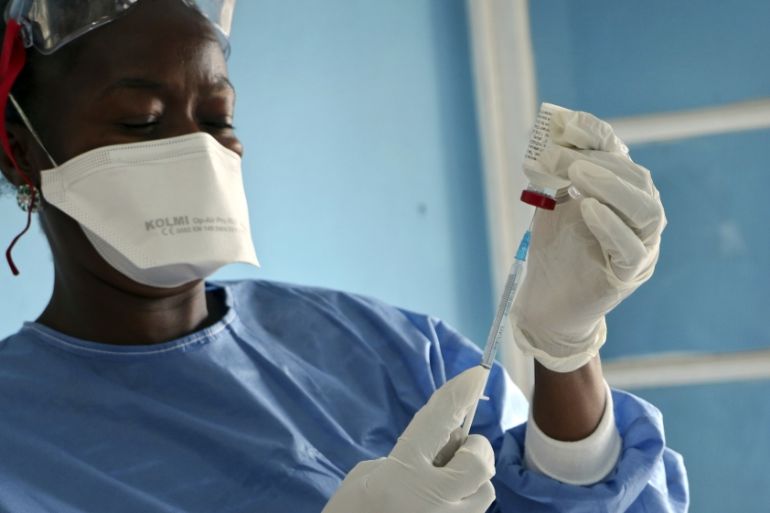DR Congo to deploy second Ebola vaccine
Vaccine made by US-based firm Johnson & Johnson to be deployed as Ebola continues to surge, DRC health officials say.

Health authorities in the Democratic Republic of the Congo (DRC) have said they plan to introduce a second Ebola vaccine to tackle the second-worst outbreak of the virus in history.
The team overseeing DRC’s response announced the move on Saturday but did not say when the vaccine – manufactured by the US-based firm Johnson & Johnson – would be introduced.
Keep reading
list of 4 itemsUganda declares end of Ebola after 4-month outbreak
Uganda’s Ebola outbreak nearly under control, says Africa CDC
Ebola vaccines produced lasting antibodies during trial: Studies
It will complement another vaccine produced by US pharmaceutical giant Merck which has been administered to more than 220,000 people since the DRC’s Ebola epidemic erupted in the country’s eastern North Kivu and Ituri provinces in August 2018.
The Johnson & Johnson product has been a source of controversy among DRC health officials.
Former health minister Oly Ilunga Kalenga, who was stripped of oversight of the Ebola response in July, opposed its use, saying it had not been proven effective and could confuse local populations.
The Johnson & Johnson vaccine requires two injections eight weeks apart, unlike the Merck vaccine, which requires a single shot. The Merck product is experimental but is estimated to be 97.5 percent effective and , according to the World Health Organization (WHO), may protect a person for up to 12 months.
In their statement, the current Ebola response team said the Johnson & Johnson product was also safe for deployment and noted that it was already being trialled in neighbouring Uganda and in the West African country of Guinea.
“It is a vaccine that other countries already use. Why can’t we use it in Congo to protect our population?” the statement said.
The statement added that health officials intended to start by offering the Johnson & Johnson vaccine to DRC traders who cross into Rwanda and then to residents of the province neighbouring the epicentre of the outbreak “to create a corridor of immunised people”.
Thousands of cases
Figures released by the DRC’s health ministry this week showed that Ebola deaths in the sprawling North African country’s eastern regions had reached 2,108, with more than 3,000 confirmed cases of the virus.
A few cases were confirmed in neighbouring Uganda earlier this year after infected patients crossed the border, but all of those individuals either died or were sent back to the DRC for specialised treatment.
Attempts to end the epidemic have repeatedly been hampered by security issues in the eastern DRC and regular attacks on medical teams trying to tackle the haemorrhagic fever amid mistrust within some communities over the outbreak and response efforts.
On Thursday, the World Health Organization (WHO) warned that transmission appeared to be worsening, after the North Kivu and Ituri provinces registered 57 new confirmed Ebola cases in the week leading up to September 17, compared with 40 new cases a week earlier.
At the same time, WHO said, a number of “localised, minor security incidents” continued to mar the response to the outbreak, including impeding safe burials of the highly contagious bodies and the administering of vaccines around the towns of Mambasa and Komanda, in Ituri province.
Even more concerning was a four-day “major security incident” that erupted in Lwemba, in the Mandima health zone in Ituri province, last Friday in reaction to the Ebola death of a local healthcare worker.
“Due to the violence that occurred during the incident, all activities have been suspended in the area until further notice,” WHO said.
The UN health agency, which in July declared the epidemic a “public health emergency of international concern”, said the suspension was having “a serious impact on the response activities on the ground”.
“It could lead to gaps or delays in the reporting of new [Ebola] cases in this hotspot area,” it cautioned.
Such incidents, WHO added, highlighted the necessity for continued and proactive engagement with communities in impacted areas.